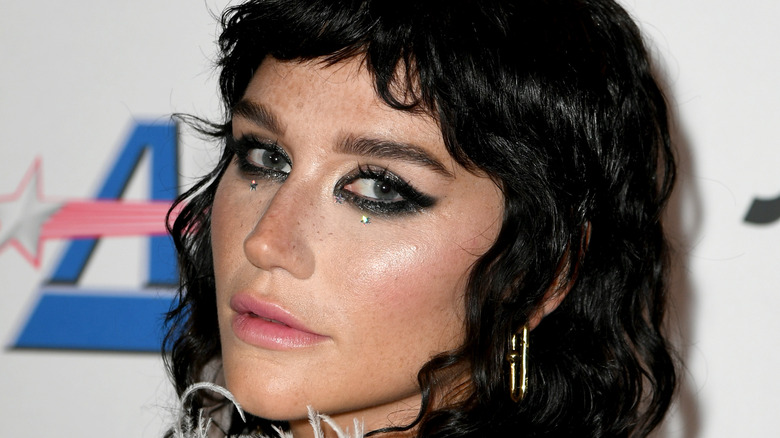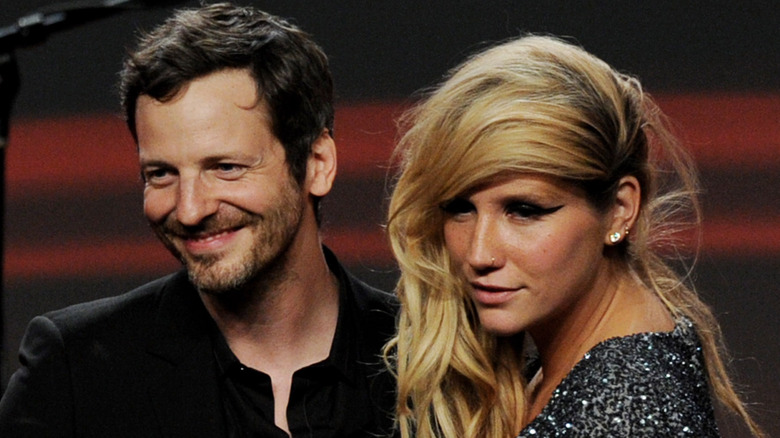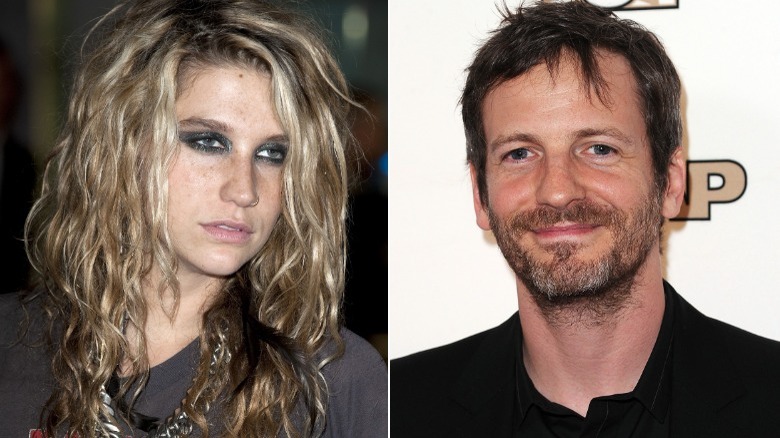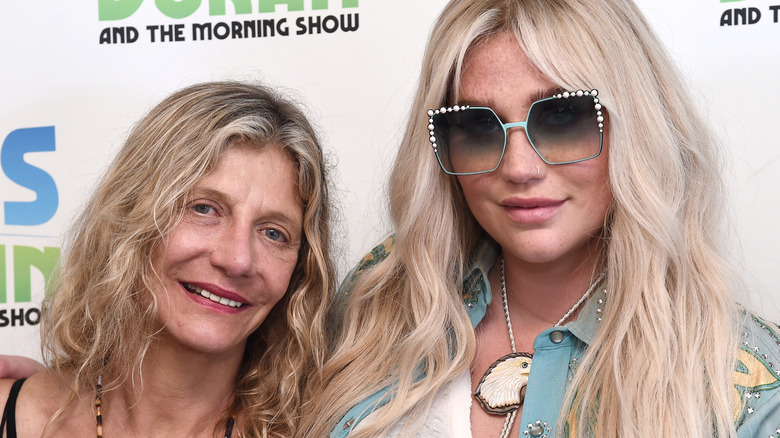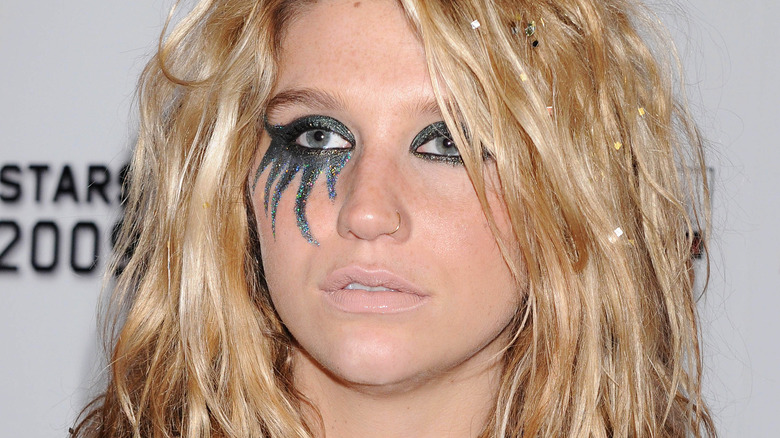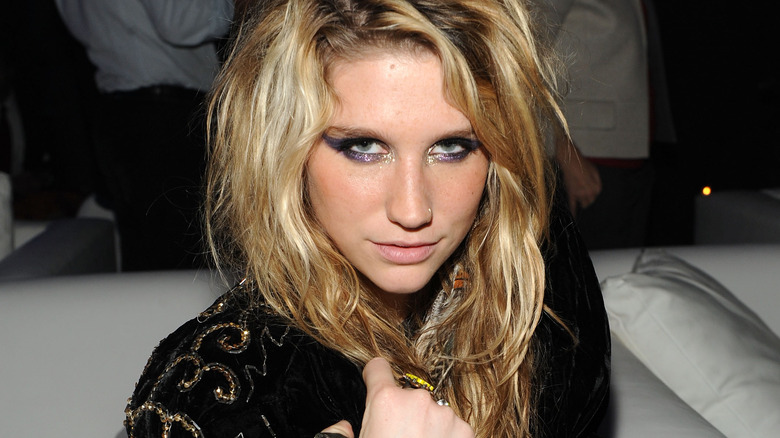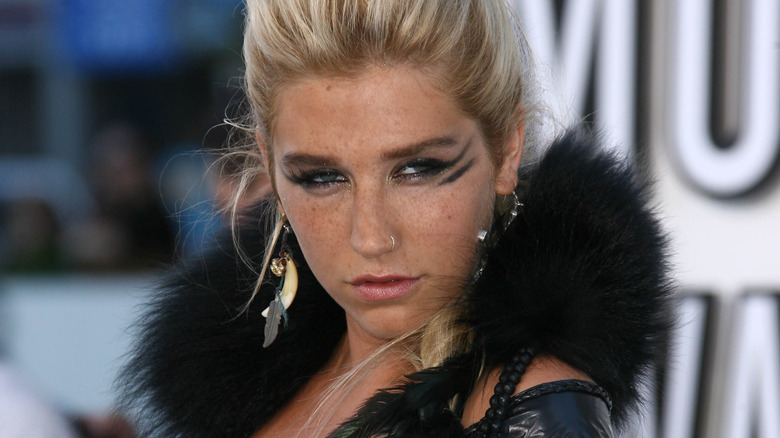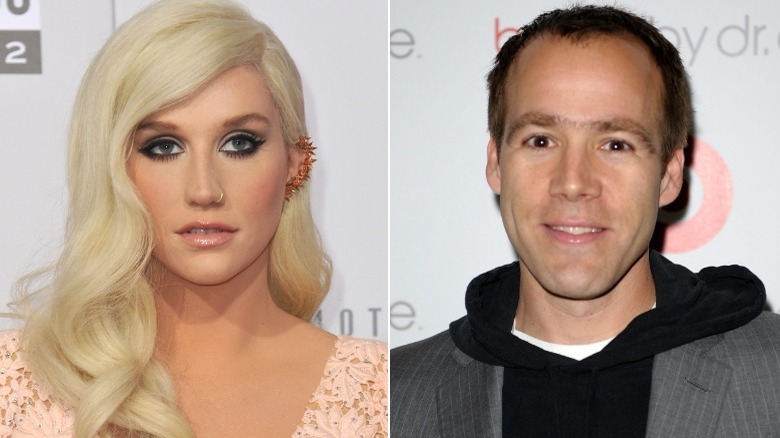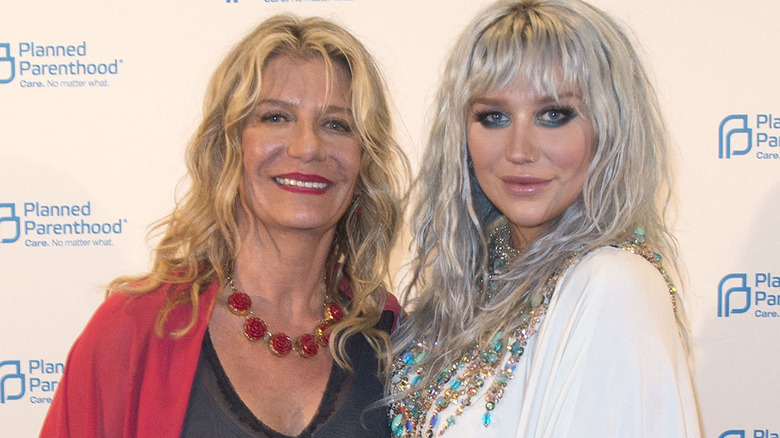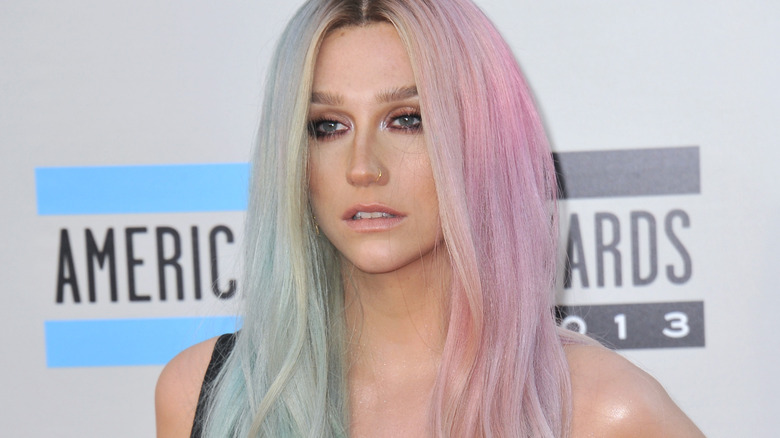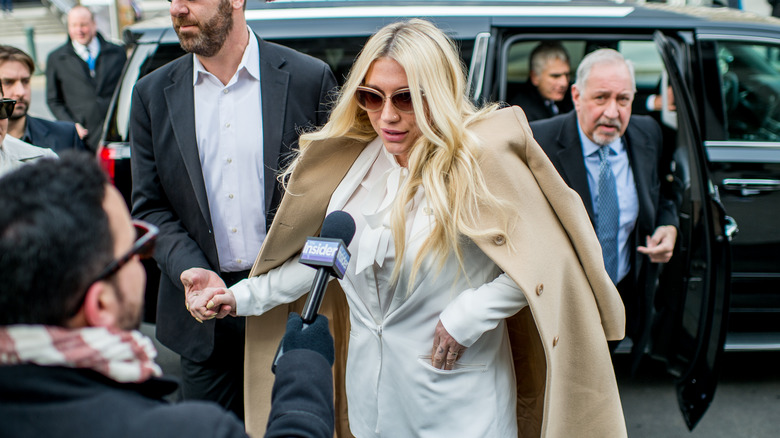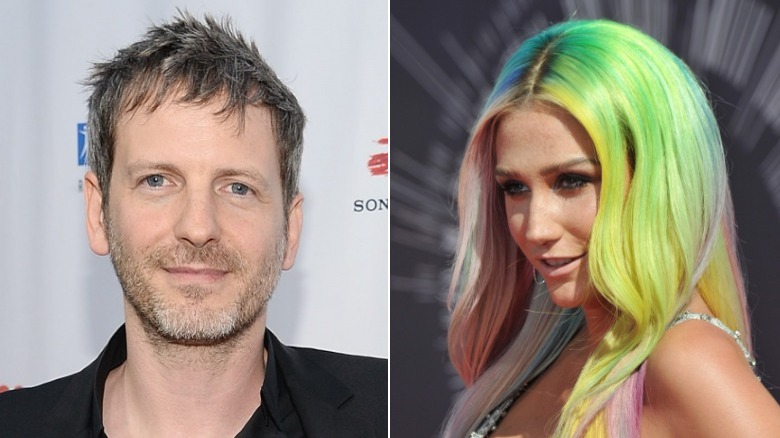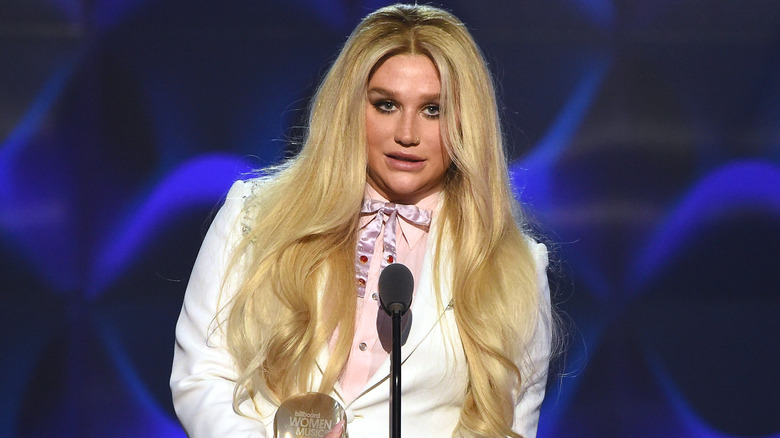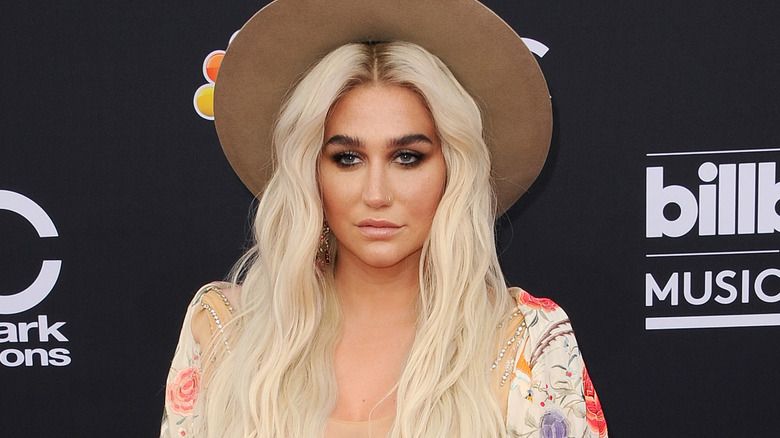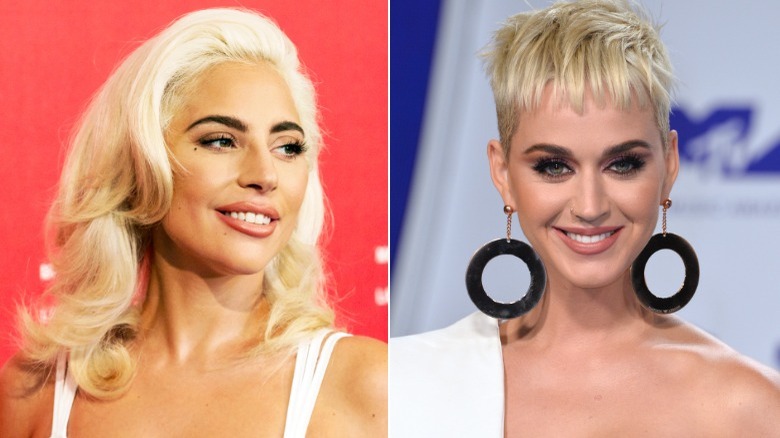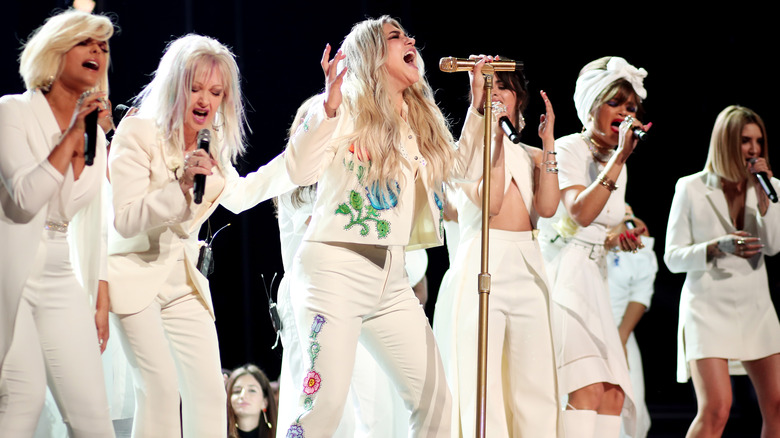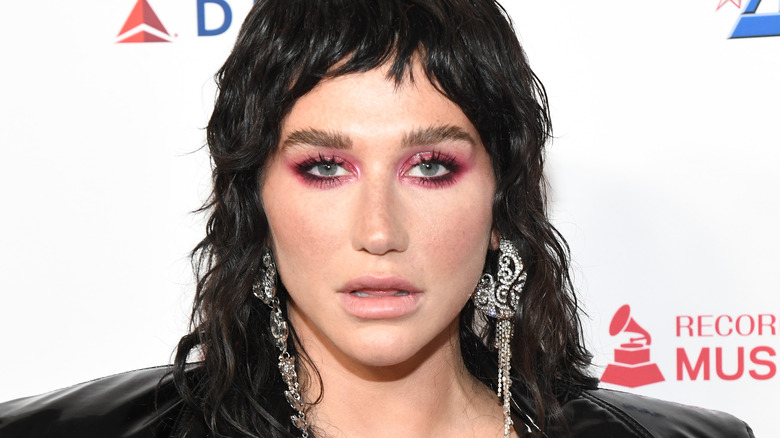The Complete Timeline Of Kesha And Dr. Luke's Troubled History
2009 was a year that defined modern pop music. Britney Spears reclaimed her reign on the Billboard charts, Taylor Swift positioned herself as the ultimate girl next door with "You Belong with Me," and Lady Gaga was just a year away from donning her infamous meat dress. Then there was Kesha.
When Kesha (born Kesha Rose Sebert) rose to fame with her breakout single "Tik Tok," she was pop's ultimate rebel. Her red carpet appearances oozed the effortless cool of someone who nonchalantly woke up an hour before she had to be there. In some regards, her day-old mascara was like war paint, helping her rally against the stereotypes of perfectly manicured, well-behaved pop stars. She was Hollywood's ultimate party girl, teasing people in the VIP section and doling out interviews about vomiting in Paris Hilton's closet — but every party has to end.
In recent years, Kesha's been entangled in a nasty legal battle with her longtime producer Dr. Luke (real name Lukasz Sebastian Gottwald), who she's accused of sprawling abuses. As she seeks freedom from her contract, she's faced with an impossible situation: let her career die young or allow her alleged rapist to profit off her art. Here's a look inside the pair's troubled relationship, which shows no signs of a resolution.
This article contains accounts of sexual assault. If you or anyone you know has been a victim of sexual assault, help is available. Visit the Rape, Abuse & Incest National Network website or contact RAINN's National Helpline at 1-800-656-HOPE (4673).
September 2005: At 18, Kesha signs a six-album recording agreement with Dr. Luke
Kesha's relationship with Dr. Luke began in 2005. The singer was about to finish her senior year of high school in Nashville, Tennessee but decided to drop out and move to Los Angeles. In an interview with Time, she revealed that she was a good student, who had scored 1500 (out of 1600) on the SATs. "I was all set out for, like, a life of academia," she admitted. "I chose instead to drop out of high school like a month away from graduation and do this. I've never looked back, though."
What we didn't know at the time was that Dr. Luke allegedly convinced the teenager to make this life-changing decision — at least, that's what she claimed, according to Buzzfeed News. Dr. Luke admitted that he "recognized her potential" after hearing her demo and decided to contact her. Shortly after moving to Los Angeles, the singer celebrated her 18th birthday and signed an exclusive six-album recording agreement with the producer. Per the agreement, Dr. Luke would receive a percentage of the sales from each album.
From the get-go, the relationship was allegedly strained. According to Buzzfeed News, Dr. Luke claimed that they only worked together for a handful of months before Kesha tried to get out of their contract. He also alleged that, at the time, she threatened to create "false allegations of abuse" if he didn't agree to release her.
October 2005: Kesha and Dr. Luke attend a party at Paris Hilton's house
Before rising to fame, Kesha had a small cameo on Paris Hilton's reality series "The Simple Life." This became the foundation of her 2014 civil suit. A month after Kesha inked her deal, both she and Dr. Luke attended an after-party for Nicky Hilton's birthday at Paris' home, but there are varying accounts about what went down. According to Billboard, Kesha's lawsuit alleged that Dr. Luke gave her something he called "sober pills," which were actually the date rape drug GHB, before taking her back to his hotel room and raping her.
In an account published in Billboard, Kesha's mother, Pebe Sebert, detailed how her daughter allegedly woke up naked and disoriented in the producer's hotel room with no memory of what happened. Kesha allegedly told her mother, "I don't know where I am. I think we had sex. I'm sore and sick. I don't know where my clothes are. I think I need to go to the hospital." The pair reportedly didn't go to the police because Kesha "just want[ed] to sing" and didn't "want to be a rape-case victim."
Dr. Luke has fervently denied Kesha's claims. In a statement (via E!), his lawyers alleged that she was "kicked out of the after-party because of her behavior" and the producer helped her "as an act of kindness." Kesha wrote the song "Paris Hilton's Closet" about vomiting at the event.
2006 - 2008: Kesha falls out with Dr. Luke over management, but the pair reunite
Over the next two years, Kesha built out her professional team. Buzzfeed News reports that in 2006, the star signed a "five-year personal management contract with DAS communications," who managed groups like the Black Eyed Peas and The Fugees. This came with the option to terminate the contract if she didn't find a record deal within a year, and it also triggered a fall out with Dr. Luke.
According to a Billboard report, the producer was pushing Kesha to sign with his friend, Larry Rudolph, who managed Britney Spears. This escalated into a blow-out at a restaurant, and neither Kesha nor her mother spoke to Dr. Luke for two years. Kesha stayed with DAS until 2008, although she didn't sign a record deal. At that point, Dr. Luke alleged that she was frustrated because "no other record company could or would sign her" (largely, because of her pre-existing contract with him). As detailed in Vulture, she reunited with the producer, fired her management, and signed to Dr. Luke's publishing company, Prescription Songs — but her mother claimed her hand was forced.
Per Billboard, Pebe alleged that Kesha called her, saying, "Dr. Luke just called me and I have 24 hours to fire my lawyer and my managers and go back with him. Anytime I get a contract, he's going to come forward and basically say he owns me. What do I do?"
2009: Kesha makes her record-breaking public debut
Not long after reuniting with Dr. Luke, Kesha was tapped to sing on Flo Rida's mega-hit "Right Round." Though her role was uncredited (and according to Billboard, not even paid), the singer was thrust into the spotlight as the song broke the single-week record for digital sales and became a No. 1 international hit. This triggered a wave of label interest — including major labels like Atlantic — but the pair opted for RCA, a subsidiary of Sony Music Entertainment.
Later that year, Kesha released her debut single "TikTok" and celebrated New Year's Day with the release of her first album, "Animal," which has since sold more than 3 million copies. The day after her album's release, "TikTok" peaked at No. 1 on the Billboard Hot 100, smashing weekly digital sales records. It spent a whopping 38 weeks on the chart in total. At the time of this writing, the track has been certified eight times platinum by the RIAA.
2010: Kesha's former management files a multimillion dollar breach of contract lawsuit
After the success of "Animal," Kesha's former management DAS Communications, filed a multimillion-dollar breach of contract lawsuit against the singer and her producer. While Buzzfeed News claims the company was seeking $50 million, Vulture (and most other reports) claim Kesha was being sued for "$14 million in unpaid commissions" on work DAS got her after their contract was terminated, while Dr. Luke was being sued for $12 million (since he allegedly interfered). Either way, DAS claimed to have "expended money and considerable time and effort" on Kesha's career, during which they actually did procure a deal with Warner Bros. As Billboard reports, the deal allegedly only failed because of Dr. Luke.
In a statement, former Warner Bros. A&R executive Kara DioGuardi — who's best known as an "American Idol" judge — revealed that Kesha initially signed a recording and publishing deal with Warner Bros. Records and Arthouse Publishing, but it was effectively killed after Dr. Luke called her to "say that he had a pre-existing contract" with the singer. After the phone call, Warner Bros. decided to "release" Kesha from their agreement.
In legal papers obtained by the Evening Standard, DAS alleged that Dr. Luke "induced, intimidated and convinced Kesha" to terminate her contract. According to Vulture, Kesha echoed this sentiment in court, claiming she was "coerced" into cutting ties with her former management.
2011: Kesha is deposed in her former management's lawsuit
The DAS lawsuit would eventually become an important piece of Kesha's 2014 civil suit against Dr. Luke, but only because of what the singer said when she was deposed in 2011. According to reports from Vulture and Buzzfeed News, the singer testified under oath that "Dr. Luke never made sexual advances" towards her, never gave her a roofie, and never gave her cocaine. She also claimed that the pair never had an intimate relationship, though they may have made out on a plane during a cross-country trip and, at some point, slept in the same bed.
When Kesha's testimony was partially unsealed in 2014, Dr. Luke tried to use it as evidence against her in their ongoing legal battle. It did directly conflict with the allegations outlined in her California suit, but her attorney claimed that, at the time of the deposition, the producer had "threatened her safety and livelihood" if she were to reveal what really happened (via Los Angeles Times).
Ultimately, Kesha was ordered to pay DAS about half of what was owed. She fought back, claiming the company acted as an unlicensed agent, which is illegal in the state of California, and the suit was settled in 2012, according to The Wrap.
2012: Kesha and Dr. Luke butt heads while recording 'Warrior'
Shortly after Kesha's deposition, Dr. Luke co-founded Kemosabe, the Sony imprint where he served as CEO. According to Vulture, Kesha's contract was brought over as part of Dr. Luke's deal. Around this time, the pair worked on her sophomore album "Warrior," but things were reportedly "strained." A New York Times profile revealed that the pair started fighting about the direction of Kesha's music. She allegedly wanted a rock sound with lyrics that ventured beyond partying, something she claimed Dr. Luke pressured her to exclude from "Animal." She ended up pushing back against his lyrical ideas.
"Lyrics that would say: 'Get that heifer out my face. I'm going to pull your ponytail back because you don't know me, b***h, you phony trick,'" she told the Times. "I was like, O.K., not going to sing that ... And then there was this argument about it."
As outlined in Kesha's 2014 lawsuit (via Billboard), this is when the singer began fielding alleged violent threats from her producer. In one instance, it caused her to "flee [from] his house barefoot," though Dr. Luke's camp has denied most of her claims. When "Warrior" was finally released in 2012, "Die Young” was pulled from radio stations in the wake of the Sandy Hook tragedy. After that, Kesha tweeted and deleted that she was "forced" to sing certain lyrics. The following year, Rolling Stone asked the singer if she had creative control, to which she replied, "not really."
2013: Kesha's mother allegedly makes the allegations public
In October 2013, Kesha's mother allegedly stepped in to help mitigate her daughter's relationship with Dr. Luke, seeking publishing rights and the termination of her daughter's contract. According to court filings obtained by Buzzfeed News, Pebe emailed the producer's attorney, threatening to go public with the allegations that would eventually be outlined in Kesha's 2014 lawsuit.
"Tomorrow I am going to start making public how Dr. Luke blackmailed me into giving him and Circuit publishing credit on all songs I wrote....Luke date raped Kesha when she was 18. Nicky Hilton's birthday? Paris Hilton's house? Luke gave Kesha pills? She ended up naked in his hotel room 2 days later, no longer a virgin? Do we want all this to come out?" She wrote. "[E]ither ... Luke releases Kesha from all legal contracts, and gives me back all my publishing, or we, Kesha and I tell the truth..."
As most of us know, Dr. Luke did not release Kesha from her contract, and Pebe reportedly wasn't afraid to follow through. Dr. Luke's attorneys claimed that Pebe began spreading around the allegations in an email that read, "Dr. Luke abused Kesha, both physically and mentally." One of the recipients was allegedly Mike Eisele, a major player in the #FreeKesha campaign, which aimed to help the singer break free from her contract.
January 2014: Kesha checks into rehab
In 2014, Kesha kicked off the new year with a stint at a Chicago rehab facility. According to Buzzfeed News, the singer revealed that she was receiving treatment for "severe depression, post-traumatic stress, social isolation, and panic attacks." Kesha was also struggling with an eating disorder that her mother claimed was fueled by Dr. Luke's verbal abuse (which he's fervently denied). Years later, she corroborated her mother's story, telling The New York Times that the producer called her a "fat [expletive] refrigerator" and publicly criticized her weight. "I was under immense pressure to starve myself," she admitted. "And I tried to and almost killed myself in the process."
During her stint in rehab, Kesha sent letters to fans outlining her alleged abuse. In one letter obtained by Buzzfeed News, the singer wrote, "Dr. Luke has tortured me & my family ... he did do what people know about + SO much more terrible s**t." She also reportedly opened up to doctors about her abusive relationship with the producer. According to TMZ, Dr. Luke's rep claimed this was all part of a "pre-planned campaign" to take the producer down.
If you are struggling with an eating disorder, or know someone who is, help is available. Visit the National Eating Disorders Association website or contact NEDA's Live Helpline at 1-800-931-2237. You can also receive 24/7 Crisis Support via text (send NEDA to 741-741).
October 2014: Kesha files her bombshell California civil suit against Dr. Luke
In October 2014, Kesha filed her explosive California civil suit against Dr. Luke, claiming that her time working with the producer was like a "prison of his abuse." According to Buzzfeed News, the lawsuit alleged that the producer had committed "sexual assault and battery, sexual harassment, gender violence, civil harassment, unfair business practices, and infliction of emotional distress" starting from when Kesha was just 18 years old, and he allegedly convinced her to drop out of high school and move to Los Angeles, where eventually allegedly "forced her to take drugs and alcohol" in an effort to abuse her.
"For the past ten years, Dr. Luke has sexually, physically, verbally, and emotionally abused Ms. Sebert to the point where Ms. Sebert nearly lost her life," the lawsuit read (via Buzzfeed News). "Dr. Luke abused Ms. Sebert in order to destroy her self-confidence, self-image, and self worth so that he could maintain complete control over her life and career."
That same day, Dr. Luke filed a lawsuit of his own in New York, alleging defamation and breach of contract. As Buzzfeed News reports, the suit — which named the singer, her management, and her mother — alleged that "extortion is the ultimate goal" of the Seberts' supposed "defamatory campaign." According to Vulture, Dr. Luke also sued Kesha's attorney for falsely alleging on social media that the producer had assaulted Lady Gaga.
June 2015 - February 2016: The back and forth
Kesha's California lawsuit was an immediate back and forth. Vulture reports that Pebe and Dr. Luke took turns suing each other in various jurisdictions as cases were either dropped or dismissed. In 2015, Kesha added Sony into the mix, claiming the label put her "in physical danger" by "[turning] a blind eye" to the abuse. She also alleged that another artist on the label had been abused by the producer, a statement that would become a major point in his case.
After Kesha added Sony to her initial filing, Dr. Luke successfully petitioned a judge to pause the California litigation until his New York suit was settled. This was the result of a clause in Kesha's contract which said legal issues had to be resolved in the Empire State (even though the alleged abuse happened in California). This spurred Kesha to file an emergency preliminary injunction. According to The Hollywood Reporter, her team argued that her career would suffer "irreparable harm" if she couldn't be released from her contract, and she was essentially at an impasse, unable to record and release new music.
In a massive blow to Kesha's case, a Supreme Court judge denied the injunction in early 2016. According to Buzzfeed News, the judge claimed there wasn't enough evidence of trauma (particularly, Kesha's alleged physical problems) and that Sony had already pledged to allow the artist to record with a different producer (though Dr. Luke would still profit off her work).
April 2016 - July 2016: Kesha's New York counterclaims are dismissed as she rebuilds her career
By 2016, it was clear that Kesha wasn't going to find a solution by turning to her record label. According to The Hollywood Reporter, after the artist filed her emergency preliminary injunction, Sony spoke out for the first time, calling the suit a "transparent and misguided attempt to renegotiate her contracts" and demanding its dismissal. As Vulture reports, the label also claimed they couldn't release Kesha from the contract since it existed prior to her relationship with Sony.
At this point, Dr. Luke had already publicly defended himself on Twitter, and Kesha received an outpouring of support from celebrities like Taylor Swift, who donated $250,000 to her legal costs, and Kelly Clarkson, who claimed in a KIIS interview that she was "blackmailed" into working with the producer. Still, her case faced another major setback when a State Supreme Court judge dismissed her abuse counterclaims in New York. Per The New York Times, the judge cited "lack of evidence and jurisdiction," writing, "Every rape is not a gender-motivated hate crime."
After the ruling, Kesha claimed that she was offered "freedom," but only if she "apologized" and retracted her allegations. She refused and started making moves to rebuild her career. She released a song with Zedd, announced a tour, and performed at Coachella. She also emerged victorious in her battle to play the Billboard Awards after Dr. Luke attempted to block her performance.
August 2016: Kesha drops her California lawsuit
After a nearly two-year battle, Kesha dropped her stalled California civil suit in August 2016. The singer planned to re-focus her efforts on the litigation in New York, which she was attempting to appeal. "My fight continues," the singer wrote in a now-deleted Facebook post (via Rolling Stone). "I need to get my music out. I have so much to say. This lawsuit is so heavy on my once free spirit, and I can only pray to one day feel that happiness again."
Behind the scenes, Kesha had been recording new music at her own expense, hoping for a release as soon as possible. Her attorney told Rolling Stone that she had "delivered 28 new songs" to her label, but in a New York Times profile, the singer opened up about how the process was seemingly stalled. She claimed there were 22 songs "sitting somewhere waiting to be completed and polished" with not even a glimmer of a release date.
In response to the profile, Dr. Luke claimed the singer "exiled herself" and was always free to move forward with her album. "She provided 22 recordings created without any label consultation which were not in compliance with her contract, were in various stages of development, and which Kesha's own team acknowledged needed work," he said (via Uproxx), claiming the label was working to develop her tracks further.
2017: Lady Gaga and Katy Perry are brought into it
In 2017, Kesha's lawsuit was still raging in New York. According to Vulture, the singer claimed Dr. Luke had "financially cut her off" and "[refused] to approve" any new music. In turn, he threatened to launch a new defamation suit, this time involving a 2016 text message that Kesha sent to Lady Gaga, in which she alleged that he had raped Katy Perry. This was thought to be the same unnamed Sony artist that Kesha previously cited when she added the record label to her initial lawsuit.
Kesha's team ultimately attributed the comment to a rumor sparked by an unnamed label CEO, but the text message sat in the SMS ether as Dr. Luke left his role at Kemosabe. A couple of months later, Lady Gaga was subpoenaed and, according to Vulture, forced to hand over the unredacted texts. Perry was also deposed and confirmed that she wasn't sexually assaulted by the producer.
Despite the text message rumor, Gaga stood behind Kesha in her testimony. According to Buzzfeed News, the singer boldly told Dr. Luke's attorney, "Do you know what it's like for survivors? Do you know what it's like to tell people? Don't you role [sic] your eyes at me. You should be ashamed of yourself." Kesha ended up losing this portion of the defamation suit. According to CBS News, she was ordered to pay $373,671.88 in interest on $1.3 million in unpaid royalties.
2018: Kesha's NYC countersuit hits a roadblock, but she keeps Praying
Amidst the drama with Lady Gaga, Kesha hit another roadblock when a judge rejected her amended New York countersuit. According to Vulture, this was her third attempt, but the judge believed that she "didn't give appropriate notice to void her songwriting contract" and a portion of her amendment was "too speculative." In an even deeper cut, the judge implied that the songwriter knowingly put herself at risk because she signed her Prescription Songs agreement in 2008, three years after the alleged sexual assault took place.
This, however, was not the most devastating blow. That came in May 2018 when, as Vulture reports, the New York appeals court "[sided] with a previous judge who ruled that Kesha is not permitted to make any further appeals" to terminate her contract in cases regarding the ongoing defamation suit. After dropping her California lawsuit, there was no longer a clear path forward.
There was still a bright side. During this time, Kesha was finally able to release the emotional music she had hoped to create at the beginning of her career. "Praying," her first solo single since the lawsuit was filed, served as a gutting ballad about forgiveness, which fans believed took aim at Dr. Luke. Her heart-wrenching performance of the single at the 2018 Grammy Awards made headlines, and her third studio album, "Rainbow," peaked at No. 1 on the Hot 100.
2020 - 2021: Kesha takes the 'High Road' as her case awaits trial
Since 2014, Kesha has been trudging forward with both her legal battle and record contract. Though the singer is still tied to Kemosabe and Sony at the time of this writing, she is taking a more hands-on approach to her music. In 2020, she released her fourth studio album, "High Road," where she served as executive producer. Pitchfork described it as "a return to the carefree party pop that defined her early career," and they gave it a 5.9 score (which might not seem like a lot, but it's rather generous for the notoriously scrupulous publication). Beyond that, the album peaked at No. 3 on Billboard's Album Sales chart.
Though it's clear that she's repaired her stalled career, it doesn't seem like Kesha's legal issues are anywhere near a resolution. In April 2021, Page Six reported that a judge in the New York state appeals court upheld the 2020 ruling regarding Kesha's text message to Lady Gaga. The judge agreed that Dr. Luke was not a public figure, and therefore, he didn't have to prove that there was actual malice behind Kesha's statement. For now, the case is set for a fall trial.

